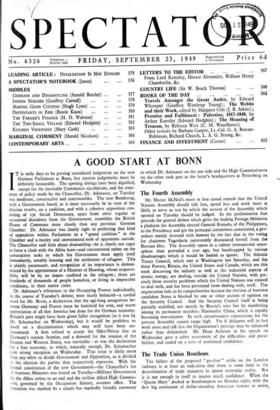The Trade Union Bourbons
The failure of the proposed " go-slow " strike on the London railways is at least an indication that there is some limit to the determination of trade unionists to ignore economic reality. But it is not enough in itself to inspire much confidence. When the Queen Mary' docked at Southampton on Monday night, with the first big contingent of dollar-spending American visitors to arrive, since the pound was devalued, they were greeted by a " go-slow " strike of the local members of the N.U.R., who were protesting against the rejection by a conciliation board of the national claim for a wage increase of los. a week. If these men are at all repre- sentative of their fellow workers—and it is too soon to assert that they are not—then that new effort which alone can turn devaluation from a mere palliative into a cure for Britain's economic troubles will never be made. As it stands strike threats and claims for higher wages at a time like this are an open declaration that the unions have learned nothing in the post-war years of crisis and failure. The trouble runs from top to bottom of the trade union movement. The original reception by the T.U.C. General Council of the news of devaluation was one of compounded sOspicion and appre- hension. The leaders of the Confederation of Shipbuilding and Engineering Unions and of the National Union of Railwaymen, thrust into prominence by the insistence of many of their members on wage claims which add up to the fantastic figure of L125,000,000 a year, are obviously in a state of confusion. They profess to be unable to cope with unrest which, it is alleged, any rise in the cost of living inspires among the advocates of unconstitutional action. They would be better employed in recalling the rank and file to a sense of public duty, and there is just a chance that such an appeal would succeed. It is not yet quite time to accept the argument that nothing but utter disaster will be enough to convince the unions that their members arc crying for the moon.



































 Previous page
Previous page